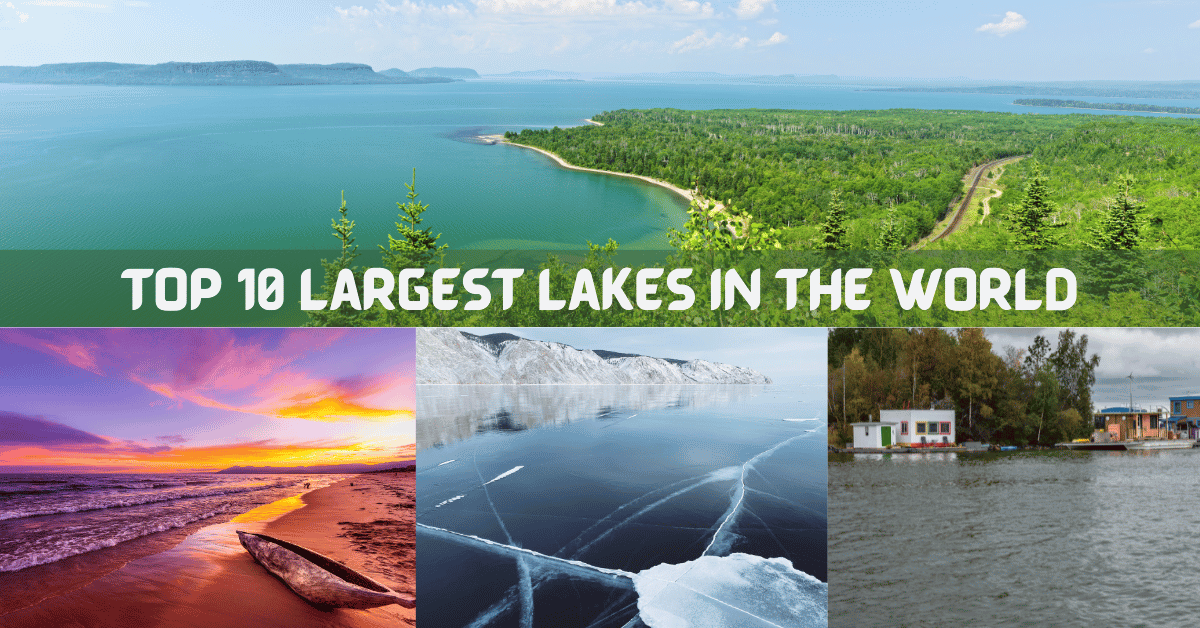Lakes are among the most breathtaking natural wonders on our planet (earth), offering serene beauty, and abundant biodiversity, and serving as vital water sources. From vast expanses of freshwater to remarkable geological formations, the world is home to numerous awe-inspiring lakes. In this article, we will delve into the top 10 largest lakes in the world, highlighting their remarkable features, ecological significance, and the captivating experiences they offer to visitors.
1. Caspian Sea:

The Caspian Sea takes the crown as the largest lake globally, stretching across an astonishing area of approximately 371,000 square kilometers. Despite its name, it is classified as a lake due to its landlocked nature. This remarkable body of water is known for its unique blend of marine and freshwater characteristics, supporting diverse ecosystems and serving as a crucial transportation route.
2. Superior Lake:

Located on the North American continent, Lake “Superior” holds the distinction of being the largest freshwater lake globally in terms of its surface area. Spanning around 82,100 square kilometers, this majestic lake borders the United States and Canada. Its pristine beauty, dramatic cliffs, and crystal-clear waters attract millions of visitors each year, offering opportunities for boating, fishing, and immersing oneself in its natural splendor.
3. Victoria Lake:

Victoria Lake, located in East Africa, ranks as the continent’s largest lake and the world’s third-largest. With an area of approximately 68,800 square kilometers, it stretches across three countries: Kenya, Tanzania, and Uganda. This stunning lake is renowned for its abundant wildlife, including hippos and a vast array of bird species, making it a paradise for nature enthusiasts and wildlife photographers.
4. Huron Lake:

Lake Huron, which forms a part of the Great Lakes system in North America, holds the distinction of being the fourth-largest lake on Earth. It boasts a surface area of about 59,600 square kilometers, offering spectacular coastlines and pristine beaches. Visitors can indulge in a variety of recreational activities, including sailing, fishing, and exploring the enchanting islands dotting the lake’s waters.
5. Michigan Lake:

Michigan Lake, another jewel in the Great Lakes system, holds the fifth position among the largest lakes globally. With an area of approximately 57,800 square kilometers, it is a popular destination for beachgoers and water sports enthusiasts. The lake’s scenic beauty, lighthouses, and charming coastal towns contribute to its allure.
6. Tanganyika Lake:

Situated in East Africa, Tanganyika Lake holds the distinction of being the second-largest freshwater lake in terms of volume and ranks as the sixth-largest lake globally when considering its surface area. Covering approximately 32,900 square kilometers, it is known for its exceptional biodiversity, featuring numerous endemic fish species. Snorkeling, diving, and exploring the lake’s remote beaches provide unforgettable experiences for adventure seekers.
7. Baikal Lake:

Baikal Lake in Siberia, Russia, stands as the world’s deepest and oldest lake, ranking seventh in terms of surface area. With a depth of over 1,600 meters and an area of around 31,500 square kilometers, it is a “UNESCO World Heritage” site and a haven for nature lovers. Its crystal-clear waters, stunning vistas, and unique flora and fauna make it a paradise for photographers and outdoor enthusiasts.
8. Great Bear Lake:

Located in Canada’s Northwest Territories, Great Bear Lake is the largest lake entirely within Canada and the eighth-largest globally. Encompassing approximately 31,000 square kilometers, it offers pristine wilderness, unparalleled fishing opportunities, and the chance to witness the Northern Lights in all their splendor.
9. Malawi (Nyasa) Lake:

Lake Malawi, alternatively referred to as Lake Nyasa, holds the distinction of being the “third-largest lake” on the African continent and ranks as the ninth-largest globally. Spanning approximately 29,600 square kilometers, it borders Malawi, Mozambique, and Tanzania. Its crystal-clear waters, diverse fish species, and idyllic tropical surroundings make it a popular destination for snorkeling, diving, and beach holidays.
10. Great Slave Lake:

Great Slave Lake, situated in the “Northwest Territories of Canada,” is recognized as the tenth-largest lake worldwide. Covering an area of about 27,200 square kilometers, it offers a pristine wilderness backdrop, excellent fishing opportunities, and a chance to explore its many islands and bays.
Conclusion:
The top 10 largest lakes in the world captivate us with their immense beauty, ecological importance, and diverse recreational opportunities. From the expansive Caspian Sea to the enchanting Great Slave Lake, each of these lakes showcases nature’s grandeur and leaves us in awe of its remarkable features. Whether it’s exploring their pristine coastlines, embarking on-water adventures, or immersing oneself in their tranquil surroundings, these lakes offer unforgettable experiences for travelers seeking to connect with the natural world.




